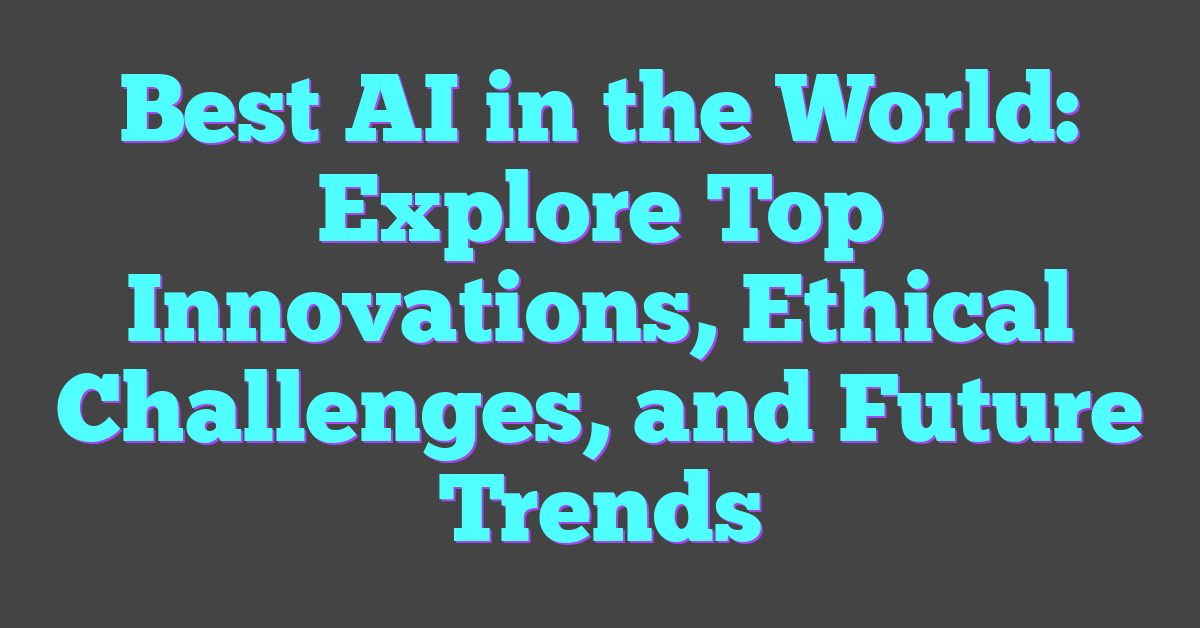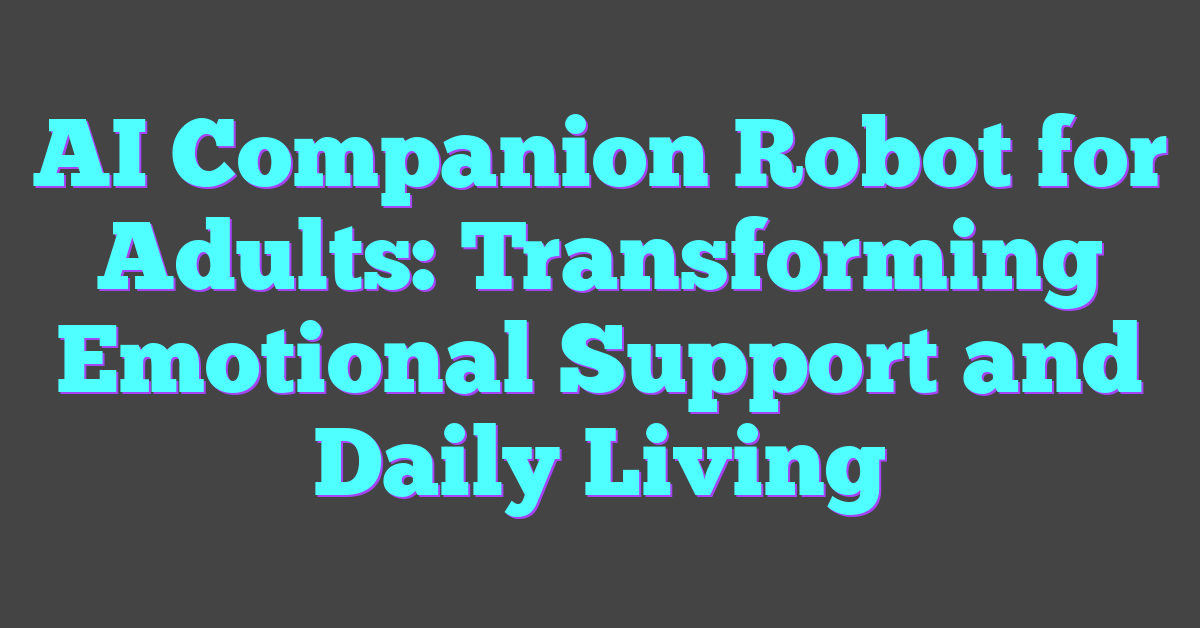Artificial Intelligence has come a long way from science fiction to becoming an integral part of our daily lives. Whether it’s powering your smartphone’s voice assistant or driving autonomous cars, AI is everywhere, making tasks easier and more efficient. But with so many advancements, which AI stands out as the best in the world?
In this article, we’ll dive into some of the leading AI technologies that are setting new benchmarks in innovation and functionality. From language processing to self-learning algorithms, these AI systems are not just fascinating but also incredibly impactful. So, let’s explore the frontrunners in the AI landscape and see what makes them truly exceptional.
Exploring the Best AI in the World
The best AI systems today are reshaping industries and redefining what’s possible. These technologies, which span various methodologies and applications, represent the pinnacle of innovation in artificial intelligence and machine learning.

Defining Artificial Intelligence
Artificial Intelligence, or AI, involves creating systems that can perform tasks typically requiring human intelligence. These tasks include learning, reasoning, problem-solving, perception, and language understanding. AI technologies often rely on algorithms, machine learning models, and neural networks to process data and make decisions.
Examples of AI in everyday applications range from natural language processing systems like GPT-3, which can generate human-like text, to computer vision systems like Google Photos, which can recognize and categorize images with high accuracy. AI’s ability to automate complex tasks makes it invaluable in fields such as healthcare, finance, and autonomous driving.
Criteria for Evaluating AI Systems
To assess the quality and effectiveness of AI systems, several criteria are considered:
- Accuracy: The system’s ability to produce correct results consistently.
- TensorFlow, a machine learning framework, provides high accuracy in image recognition tasks.
- Scalability: Efficiency in handling growing amounts of data and users.
- Amazon’s Alexa can manage millions of voice commands daily, showcasing its scalable infrastructure.
- Speed: The quickness of processing data and delivering outcomes.
- IBM Watson’s rapid data analysis helps medical professionals diagnose conditions faster.
- Usability: Ease of integration and use in various applications.
- PyTorch simplifies model development, making it accessible for researchers and developers.
- Adaptability: Ability to learn and improve from new data.
- AlphaGo, developed by DeepMind, adapts its strategies after each game to enhance performance.
These criteria ensure that AI systems not only perform tasks effectively but also improve over time, making them valuable assets in their respective domains.
| Criterion | Example |
|---|---|
| Accuracy | TensorFlow in image recognition |
| Scalability | Amazon Alexa |
| Speed | IBM Watson in data analysis |
| Usability | PyTorch |
| Adaptability | AlphaGo |
By applying these criteria, experts in AI and machine learning can identify and develop superior AI systems that push the boundaries of innovation and impact.
Leading AI Innovations and Their Impact
Leading AI innovations are setting unprecedented benchmarks across various sectors, transforming industries and enhancing efficiency.
AI in Healthcare
AI’s integration in healthcare is revolutionizing patient care. AI algorithms analyze medical images to detect anomalies faster and with greater precision than human counterparts. For instance, Google’s DeepMind uses deep learning to identify eye diseases from retinal scans, reducing diagnostic time. AI also assists in personalized medicine, where algorithms predict patient responses to treatments, optimizing therapies.
AI in Autonomous Vehicles
Autonomous vehicles rely heavily on AI to navigate and ensure safety. AI systems process vast amounts of data from sensors and cameras in real-time. For example, Tesla’s Autopilot uses machine learning to improve driving decisions. These AI systems interpret traffic conditions, recognize obstacles, and make split-second decisions, reducing accidents and increasing transportation efficiency.
AI in Finance
In finance, AI enhances both security and efficiency. Machine learning algorithms detect fraudulent activities by analyzing transaction patterns. JPMorgan’s COiN, for example, reviews legal documents in seconds, saving considerable time and reducing errors. Moreover, AI-powered robo-advisors provide personalized investment advice, making financial planning more accessible and tailored to individual needs.
Key Players in AI Development
Global advancements in AI stem from contributions by major tech companies and innovative startups, each driving the technology forward with unique solutions and approaches.
Major Tech Companies
Several tech giants lead the AI sector, leveraging immense resources and research capabilities.
- Google: Google has integrated AI extensively into its products. With DeepMind, it achieved milestones like AlphaGo, which defeated the world champion Go player. Google’s TensorFlow is a widely used open-source machine learning framework.
- Amazon: Through AWS, Amazon offers AI services including machine learning models and infrastructure. Rekognition provides image and video analysis, while Alexa exemplifies advanced natural language processing.
- Microsoft: Microsoft Azure delivers a suite of AI tools and services. The company invests heavily in AI research, exemplified by breakthroughs in computer vision and speech recognition.
- IBM: IBM Watson stands as a cornerstone of enterprise AI. It assists businesses with natural language processing, machine learning, and data analytics.
- Facebook: Facebook’s AI Research (FAIR) focuses on advancing machine learning and AI to improve user experience. Projects range from image and speech recognition to augmented reality.
Up-and-coming Startups
Innovative startups play a crucial role in advancing AI with fresh approaches and cutting-edge solutions.
- OpenAI: OpenAI aims to build safe and beneficial AI. GPT-3, a natural language processing model, demonstrates near-human text generation capabilities.
- UiPath: UiPath automates business processes through robotic process automation (RPA) combined with AI, improving efficiency and reducing operational costs.
- SenseTime: SenseTime is a leader in computer vision and deep learning, with applications in security, finance, and healthcare. Their facial recognition technology is widely recognized for its accuracy.
- CognitiveScale: CognitiveScale leverages AI for enterprise decision-making, offering solutions in personalized healthcare, financial services, and customer engagement.
- DataRobot: DataRobot provides an automated machine learning platform, enabling businesses to build and deploy AI models quickly, enhancing decision-making and operational efficiencies.
Tech companies and startups continue to innovate, ensuring AI’s transformative impact on diverse industries.
Ethical Considerations and Future Challenges
As AI’s influence continues to grow, addressing ethical considerations and future challenges remains essential.
Addressing AI Bias
Mitigating AI bias is critical for fair, unbiased systems. Bias in AI arises when algorithms reflect prejudices in training data. For instance, biased data in hiring algorithms can perpetuate discriminatory practices. Researchers and developers implement diverse datasets and refined algorithms to reduce bias. Tools like Google’s “What-If Tool” help analyze and understand bias in models. Additionally, initiatives like IBM’s AI Fairness 360 toolkit offer resources to detect and mitigate bias, promoting ethical AI usage.
Predicting Future AI Trends
Anticipating future AI trends requires examining current innovations and limitations. In the coming years, AI is expected to advance in several areas:
- Explainability: Enhancing algorithm transparency to make AI decisions understandable.
- Autonomous Systems: Increased reliability and deployment of self-driving cars and drones.
- Healthcare: Improved diagnostic tools and personalized treatments, leveraging vast datasets.
- Natural Language Processing (NLP): More sophisticated chatbots and virtual assistants offering human-like interactions.
Tech companies and startups continue to drive AI advancements, shaping the future landscape.
Conclusion
AI’s journey from its early days to its current state is nothing short of remarkable. As it continues to evolve, its impact on various sectors like healthcare and transportation will only grow stronger. The collaborative efforts of tech giants and innovative startups are paving the way for groundbreaking advancements.
Addressing ethical challenges and AI bias remains crucial to ensure fair and equitable outcomes. Tools for bias detection and mitigation are steps in the right direction. Future trends promise even more exciting developments in AI, making it an integral part of our daily lives.
The future of AI is bright, filled with possibilities that can transform industries and improve lives. As technology advances, staying informed and engaged with these changes will help us harness AI’s full potential responsibly.
Frequently Asked Questions
What is the current role of AI in healthcare?
AI is used in healthcare for diagnostic tools, personalized treatment plans, and predictive analytics to improve patient outcomes and operational efficiencies.
How are autonomous vehicles using AI?
Autonomous vehicles use AI for navigation, object detection, and real-time decision-making to safely drive without human intervention.
Which major companies are contributing to AI advancements?
Companies like Google, Amazon, and OpenAI are at the forefront of AI development, contributing significantly through research, products, and partnerships.
What are some ethical considerations in AI development?
Ethical considerations include concerns about bias, privacy, and the societal impact of AI technology, emphasizing the need for ethical guidelines and regulations.
How can AI bias be addressed?
AI bias can be addressed by using diverse datasets and refining algorithms. Tools like Google’s “What-If Tool” and IBM’s AI Fairness 360 help analyze and mitigate bias.
What advancements are expected in AI’s future trends?
Advancements include improved algorithm explainability, autonomous systems like self-driving cars, enhanced healthcare tools, and more sophisticated Natural Language Processing applications.
How do companies like Google and OpenAI contribute to AI ethics?
They contribute by developing tools and frameworks for bias analysis, promoting transparency, and collaborating on ethical standards in AI research and applications.




